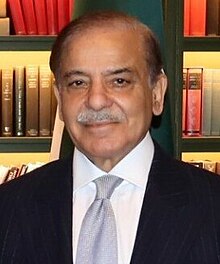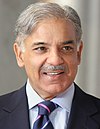
The Pakistan Muslim League (Noon) (Urdu: پاکستان مسلم لیگ (ن), abbr.PML(N) or PML-N) is a centre-right, conservative liberal political party in Pakistan. It is currently the third-largest party in the Senate. The party was founded in 1993, when a number of prominent conservative politicians in the country joined hands after the dissolution of Islamic Democratic Alliance, under the leadership of former Prime Minister Nawaz Sharif. The party's platform is generally conservative, which involves supporting free markets, deregulation, lower taxes and private ownership. Although the party historically supported social conservatism, in recent years, the party's political ideology and platform has become more liberal on social and cultural issues; however, members have been accused of using Islamist populist rhetoric. Alongside the Pakistan Tehreek-e-Insaf (PTI) and Pakistan People's Party (PPP), it is one of the three major political parties of the country.

The prime minister of Pakistan is the head of government of the Islamic Republic of Pakistan. Executive authority is vested in the prime minister and his chosen cabinet, despite the president of Pakistan serving as the nominal head of executive. The prime minister is often the leader of the party or the coalition with a majority in the lower house of the Parliament of Pakistan, the National Assembly where he serves as Leader of the House. Prime minister holds office by virtue of their ability to command the confidence of the National Assembly. The prime minister is designated as the "chief executive of the Islamic Republic".
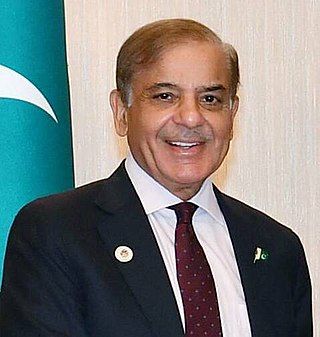
Mian Muhammad Shehbaz Sharif is a Pakistani politician and businessman who is currently serving as the 24th prime minister of Pakistan since March 2024, having previously served in the post from April 2022 to August 2023. He has also served as the president of the Pakistan Muslim League (N) (PML-N). Previously in his political career, he served as the chief minister of Punjab three times, making him the longest-serving chief minister of Punjab.
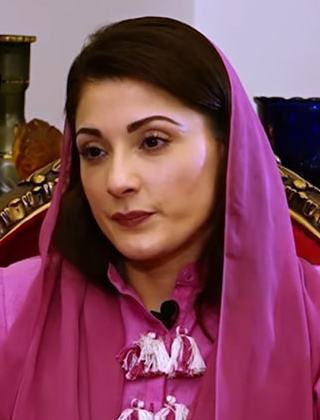
Maryam Nawaz Sharif is a Pakistani politician, currently serving as the 20th Chief Minister of Punjab, in office since 26 February 2024. She is the daughter of former Prime Minister of Pakistan Nawaz Sharif and her initial involvement in public life was through her family’s philanthropic organisations. However, her political career began in earnest in 2012 when she took charge of the election campaign for the 2013 general elections. Following the elections, she was appointed as the Chairperson of the Prime Minister’s Youth Programme in 2013. Despite her active role, she resigned from the position in 2014 after her appointment was legally challenged in the Lahore High Court.
Qazi Faez Isa is a Pakistani jurist who is currently serving as the 29th Chief Justice of Pakistan (CJP) since 17 September 2023. He was appointed as a justice of the Supreme Court in 2014, having previously served as the chief justice of Balochistan High Court from 2009 to 2014.

General elections were held in Pakistan on 25 July 2018 to elect the members of the 15th National Assembly and the four Provincial Assemblies. The three major parties were Pakistan Tehreek-e-Insaf (PTI), led by Imran Khan, the Pakistan Muslim League, led by Shehbaz Sharif, and the Pakistan People's Party, led by Bilawal Bhutto. The PTI won the most seats in the National Assembly but fell short of a majority; the party subsequently formed a coalition government with several smaller parties. At the provincial level, the PTI remained the largest party in Khyber Pakhtunkhwa (KP); the Pakistan Peoples Party (PPP) retained its dominance in Sindh; and the newly formed Balochistan Awami Party (BAP) emerged as the largest party in Balochistan. In Punjab, the result was a hung parliament, with the Pakistan Muslim League (N) winning the most seats. However, after several independent MPAs joined the PTI, the latter became the largest party and was able to form a government.
Marriyum Aurangzeb is a Pakistani politician who currently serves as Senior Minister in the Government of Punjab, in office since March 2024.
Dr. Khalid Maqbool Siddiqui is a Pakistani politician who is 1st Chairman of the MQM since 2024, and had been Federal Minister for Information Technology and Telecommunication, in office from 20 August 2018 to 6 April 2020. He has been a member of the National Assembly of Pakistan since February 2024 and previously served in this position from August 2018 till August 2023 and the leader of the Muttahida Quami Movement Pakistan, since February 2018.
Ihtisab March was a protest march led by Imran Khan of the Pakistan Tehreek-e-Insaf against prime minister Nawaz Sharif. The march was in response to the Panama Papers in 2016 and PTI organized it over the claims of corruption of the Sharif family. The march began on 7 August 2016 from Peshawar.

The Panama Papers case, or the Panamagate case, was a 2017 landmark decision by the Supreme Court of Pakistan that disqualified Nawaz Sharif, the prime minister of Pakistan, from holding public office for life.

Sikandar Sultan Raja is a retired Pakistani civil servant who has been the Chief Election Commissioner of Pakistan since January 2020. Raja belongs to the Pakistan Administrative Service and is batchmates with Rizwan Ahmed, Hussain Asghar, Fawad Hasan Fawad and Jawad Rafique Malik.

General elections, originally scheduled to be held in 2023, were held in Pakistan on 8 February 2024 to elect the members of the 16th National Assembly. The Election Commission of Pakistan announced the detailed schedule on 15 December 2023.
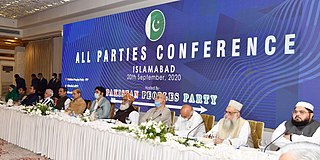
The Pakistan Democratic Movement was a coalition of political parties in Pakistan. It was founded in September 2020 as a opposition movement against Imran Khan, accusing his administration of poor governance, political victimization of opponents, and mismanaging the economy and foreign policy. Khan rebuked these allegations, during and after his tenure as Prime Minister

In April 2022, a no-confidence motion against Imran Khan led to his removal as the prime minister of Pakistan. Based largely on the Westminster system of legislature, the prime minister commands confidence of the majority of the lower house of Parliament, the National Assembly of Pakistan, under clause (2A) of Article 91 of the Constitution. Numerous opposition parties joined forces to file the motion of no confidence against Imran Khan in the National Assembly. It ultimately led to the removal of Khan from office as a majority passed the motion in the Lower House.
The constitutional crisis in Pakistan's Punjab province began on 28 March 2022, when Usman Buzdar tendered his resignation as Chief Minister at the request of Prime Minister Imran Khan and nominated former Chief Minister Chaudhry Pervaiz Elahi to replace him. On 1 April 2022, his resignation was accepted by then Governor of Punjab, Chaudary Mohammed Sarwar.

Provincial elections were held in the Pakistani province of Punjab on 8 February 2024 to elect a new provincial legislature. On 5 August 2023, the results of the 2023 digital census were approved by the Council of Common Interests headed by Prime Minister Shehbaz Sharif. Therefore, elections have been delayed for several months, as new delimitations will be published on 14 December 2023, as announced by the Election Commission of Pakistan (ECP). On 2 November 2023, the ECP announced, in agreement with the President of Pakistan, Arif Alvi, that the elections will be held on 8 February 2024. The election was held concurrently with nationwide general elections and other provincial elections.
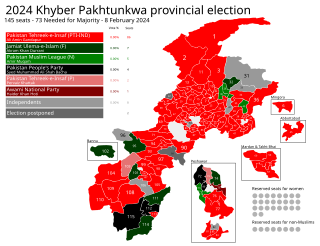
Provincial elections were held in the Pakistani province of Khyber Pakhtunkhwa on 8 February 2024 to elect members of the 12th Provincial Assembly of Khyber Pakhtunkhwa. On 5 August 2023, the results of the 2023 digital census were approved by the Council of Common Interests headed by Prime Minister Shehbaz Sharif. Therefore, elections have been delayed for several months, as new delimitations will be published on 14 December 2023, as announced by the Election Commission of Pakistan (ECP). On 2 November 2023, the ECP announced, in agreement with the President of Pakistan, Arif Alvi, that the elections would be held on 8 February 2024. This election was held concurrently with nationwide general elections and other provincial elections.

The Toshakhana reference case was a landmark decision by the Election Commission of Pakistan (ECP) that disqualified Imran Khan, former prime minister of Pakistan, from holding public office for five years.
On 3 November 2022, Imran Khan, former prime minister of Pakistan and chairman of the Pakistan Tehreek-e-Insaf (PTI) political party, was shot in an assassination attempt in Wazirabad, Punjab, during the 2022 Azadi March II against the Pakistan government. The gunman also injured a number of other PTI leaders and killed a supporter.The attacker's name is Muhammad Naveed and another unidentified gunman was killed.

The 2022–23 Pakistan political unrest was a series of political crises after the ousting of former prime minister Imran Khan through a no-confidence motion in April 2022. The crises began in 2022 when the opposition joined hands and submitted a no-confidence motion against Imran Khan's government in the National Assembly. Prime Minister Imran Khan urged the Pakistani establishment not to stay neutral and play its role to save his government and not let historical rival politicians with alleged corruption charges take over, but the establishment refused.
